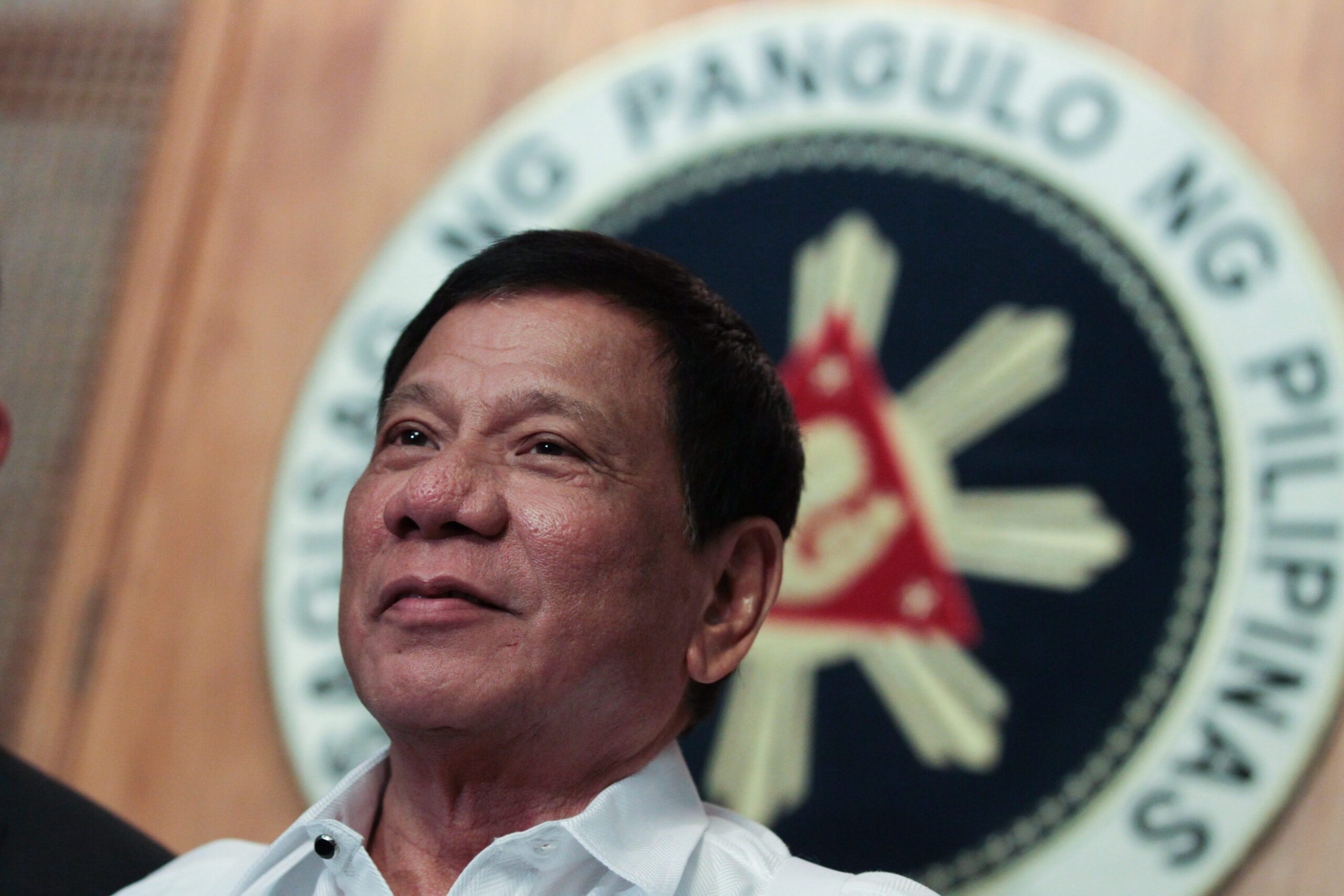SUMMARY
This is AI generated summarization, which may have errors. For context, always refer to the full article.

PAMPANGA, Philippines – President Rodrigo Duterte on Thursday, December 22, said he wants the Constitution amended to make it less difficult for any president to declare martial law, saying the current safeguards were mere “reckless reaction” to what Filipinos experienced during Martial Law.
He also said there is a need to review the current term limit on local officials, where a maximum of 3 consecutive 3-year terms is allowed.
Article VII, Section 11, Paragraph 2 of the 1935 Constitution states: “The President shall be commander-in-chief of all armed forces of the Philippines and, whenever it becomes necessary, he may call out such armed forces to prevent or suppress lawless violence, invasion, insurrection, or rebellion, or imminent danger thereof, when the public safety requires it, he may suspend the privileges of the writ of habeas corpus, or place the Philippines or any part thereof under martial law.”
But Section 18 of the same article of the 1987 Constitution replaced the martial law provision of the 1935 Constitution. It states that martial law may be declared by the president only in case of invasion or rebellion for a period of only 60 days.
The President is also required to submit a report to the Congress within 48 hours after the proclamation of martial law or suspension of the privilege of the writ of habeas corpus. Members of the Senate and the House of Representatives would then vote jointly to revoke the proclamation or extend its effectivity if the invasion or rebellion persists and public safety requires it.
The Supreme Court has the power to review the martial law declaration or suspension of the privilege of the writ of habeas corpus if any citizen questioned the sufficiency of the factual basis for the proclamation or suspension of the privilege of the writ and promulgate a decision within 30 days.
Flirting with martial law
“Kung mag-declare ako ng martial law at may invasion ngayon o giyera, I cannot proceed on and on, lalo na kung may gulo. Pupunta pa ako sa Congress, pupunta pa ako doon sa Supreme Court, if there is anybody who’d file a complaint to look into the factual, kung totoo ba, which you could not do,” Duterte said in a speech in Angeles City.
(If I declare martial law and there’s an invasion now or a war, I cannot proceed on and on, especially if there’s chaos. I’ll have to go to Congress, I’ll have to go to the Supreme Court, if there is anybody who’d file a complaint to look into the factual, if it’s true, which you could not do.)
“Eh kung iba ang Supreme Court, magsabi ang Congress yes, no ito, or no ito, yes itong isa? Saan mo ako ilagay? Kaya kailangan ko talagang palitan ‘yan,” Duterte said in a speech before community drug watch volunteers. (What if the Supreme Court says something else, Congress says yes, the other says no or the other says no and the other says yes? Where do I position myself? So I need to change that.)
The President, however, added: “There is a safety measure there. I’ll just tell you later.”
Duterte has flirted with the idea of declaring martial law in the past. In an October speech, he said the extent of the country’s drug problem has tempted him to declare martial law.
He has also said that if “forced,” he could suspend the privilege of the writ of habeas corpus if lawlessness, particularly because of the illegal drug trade, persists.
In the past, Duterte had conceded that martial law under the late dictator Ferdinand Marcos did not improve Filipinos’ lives. But in his Thursday speech, Duterte pointed out that the provisions in laws then that allowed Marcos to declare martial law unilaterally was not his fault.
“But because nangyari sa atin, ‘yun… lahat ng ginawa ni Marcos, although, it was not Marcos’ Consitution, sinira, sinira. Pati ‘yung martial law powers ng presidente,” he said.
(But because of what happened to us, all that Marcos did… although it was not Marcos’ Constitution… it was ruined, ruined. Even the martial law powers of the president.)
Term limits
Aside from the provisions on martial law, another “reckless reaction” to what Filipinos experienced under the Marcos regime was the term cap for local officials, Duterte said.
“The three-term limit [for local officials], that’s a bad law. Ask any governor or mayor. One payment for debt, then get in the project, the money. That was an almost a reckless reaction to Marcos at that time. We were just swayed by our anger. That Constitution was not a product of Marcos. He never took part in it because the 1935 Constitution, they were Claro Recto, Quintin Paredes. The next person (Marcos) had no fault,” he said in a mix of English and Filipino.
Under the 1935 Constitution, the term of office of the president and the vice president is 4 years and they can seek reelection. Senators have a term of 6 years, and congressmen 4 years; both may seek reelection.
The 1973 Constitution, which was enacted during Martial Law, set the terms of office of the president, vice president and members of the National Assembly at 6 years. They all may be reelected.
Under Batas Pambansa 337, the Local Government Code that took effect in 1983, all local officials had a term of office of 6 years and were allowed to run for reelection as long as the voters wanted them.
But Republic Act 7160, the local Government Code of 1991, shortened the terms of local officials to only 3 years and allows them to hold the same office for only 3 successive terms. – Rappler.com
Add a comment
How does this make you feel?
There are no comments yet. Add your comment to start the conversation.